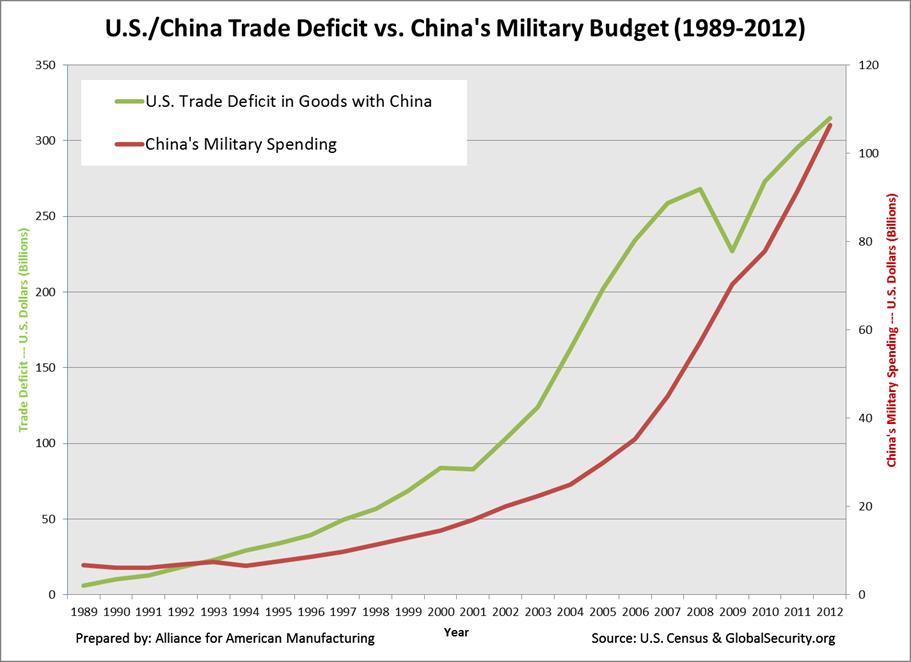The trade deficit is a measure of how much money and how many jobs we are transferring in or out of the country. The May trade deficit was just reported, and it jumped sharply. Other countries see themselves as countries and compete with us as a country while we refuse to respond as a country, so we are losing that competition. As a result we are losing trillions of dollars, millions of jobs, entire industries and our future.
May Trade Deficit
In May imports rose while exports dropped, a double-whammy that caused our trade deficit to jump more than 12%, from 40.1 billion in April to $45.0 billion. Imports went up 1.9 percent to $232.1 billion. Exports dropped 0.3 percent to $187.1 billion.
Reuters notes that "imports of services, autos and auto parts, and food, feeds and beverages also hit record highs, as did total non-petroleum imports."
The reason exports dropped was economic slowdown in other countries combined with one-way trade deals that allow countries to get away with selling more to us than they buy from us. This benefits the 1% here by forcing wages down and rearranging the economy so more goes to ... the 1%. But it eats the rest of the country alive and "hollows out" the middle class.
Trade Deals That Make Democracy A Competitive Disadvantage
The reason imports increased is because the one-way trade deals make democracy a competitive disadvantage. They turn democracy into a "cost."
In democracies where people have a say people say they want good wages, worker safety, environmental protections and taxes that provide good schools and roads etc.
In countries where people don't have a say they are told they can't have those things, which means "costs" are lower.
We should not allow American companies to move jobs and factories to countries with lower wages and lower levels of protection of human rights, worker safety and the environment. That just undermines our own wages, rights and protections. We should not allow goods that are made without this level of wage, rights and environmental protections to be sold here for lower prices that undermine our companies.
When we do not protect ourselves and our democracy from those lower costs in non-democracies, this massive trade deficit and hollowing-out of our middle class is inevitably the result. This undermining of our democracy by the wealthy who benefit from this undermining is the inevitable result as well.
We should impose tariffs on goods from low-wage, low-protection countries so their goods do not undermine our standard of living, and use the proceeds to increase the international competitiveness of goods made here, including free education, government-funded research, even subsidies on exports as needed to ensure a balance of trade. We can withdraw these tariffs and subsidies as other countries increase their own level of wages, rights and protections.
China
It's always important to look at the trade relationship with China, because that is the biggest hole in our trade budget.
Imports from China jumped 10.7 percent to $36.6 billion. The monthly U.S. goods deficit with China climbed to $27.9 billion in May, up from $24.1 billion in April.
The Alliance for American Manufacturing released this chart illustrating how our trade deficit finances China's military expansion:

How Do We Fix This?
1) First our country's leadership has to recognize the seriousness of the trade deficit problem and what it does to our own wages, rights and protections. Imagine what we could do with the hundreds of billions - trillions over time - that have left our economy as we borrow to purchase from others instead of trading with balance.
Well-funded Wall Street campaigns have succeeded in giving the impression that the budget deficit is a problem, while ignoring the real problem which is this trade deficit. The budget deficit is largely money we owe ourselves and which has been used to make our lives and economy better. But the trade deficit just drains money, jobs and our future.
2) Trade agreements that are not "trade" agreements should be renegotiated. These one-sided, one-way deals have drained our economy because they encourage other countries to sell to use without buying from us, while not improving their own wages, rights and protections. Yes, these "trade" agreements enrich the 1% everywhere but this is at the expense of the rest of us, our economy and our ability to make a living in the future. We need leadership that cares about the way these trade deals make democracy into a competitive disadvantage, destroying the middle class -- but greatly enriching the 1%.
3) Following #1, the country's leadership must recognize that other countries compete with us as a country. Whether America's political and business leadership think it is out-of-date to see the United States as a country or not, other countries do see themselves as countries and us as a competing country, and compete with us that way. We are in an economic struggle as a country and we are losing that struggle because we cling to an ideology (that conveniently benefits the funders of that ideology) that refuses to develop a unified national economic and manufacturing strategy as a country.
-----
Follow me and CAF on Twitter:



